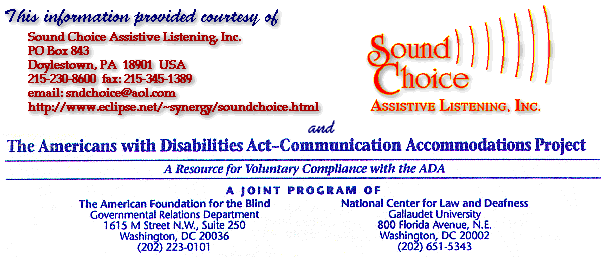
EFFECTIVE COMMUNICATION FOR
DEAF INDIVIDUALS IN STATE AND LOCAL COURTS; OBLIGATIONS
UNDER THE AMERICANS WITH DISABILITIES
ACT
State and local courts are subject to Title II of the ADA,
42 U.S.C . Sections12131-12134, which applies to "public
entities." The U.S. Department of Justice has issued
regulations explaining the requirements of that Act, 28
C.F.R. Part 35, 56 Fed. Reg. 35694 (July 26,1991) (U.S.
Department of Justice Final Rule: Nondiscrimination on the
Basis of Disability in State and Local Government
Services).
Title II of the ADA requires local and
state courts to provide qualified sign language
interpreters, and other auxiliary aids such as transcription
or assistive listening systems, to ensure effective
communication with deaf and hard of hearing individuals. 28
C.F.R. Section 35.160. Deference must be given to the deaf
or hard of hearing individual's choice of what auxiliary aid
he or she needs:
In determining what type of
auxiliary aid and service is necessary, a public entity
shall give primary consideration to the requests of the
individual with disabilities.
28 C.F.R. 35.160(b)(2). In its
Analysis of this section of the regulation, the Justice
Department has explained that it is important to defer to
the request of the individual because there is so large a
variety of auxiliary aids and services and circumstances
which will require effective communication. It gave as an
example, the different ways in which effective communication
can be achieved in the courtroom:
[S]ome courtrooms are
now equipped for "computer-assisted transcripts," which
allow virtually instantaneous transcripts of courtroom
argument and testimony to appear on displays. Such a
system might be an effective auxiliary aid or service for
a person who is deaf or has a hearing loss who uses
speech to communicate, but may be useless for someone who
uses sign language. Although in some circumstances a
notepad and written materials may be sufficient to permit
effective communication, in other circumstances they may
not be sufficient.
56 Fed. Reg. 35711-12 (July 26,
1991).
The Department of Justice further
explained that a qualified interpreter may be necessary when
the information being exchanged "is complex, or is exchanged
for a lengthy period of time. Generally, factors to be
considered in determining whether an interpreter is required
include the context in which the communication is taking
place, the number of people involved, the importance of the
communication." Id.
The Title II regulation defines a
qualified interpreter as one who is able "to interpret
effectively, accurately, and impartially both receptively
and expressively, using any necessary specialized
vocabulary." 28 C.F.R. Section 35.104. In its Analysis, the
Justice Department cautions that this definition does not
limit or invalidate state-imposed interpreter standards that
are more stringent than the ADA's definition. Thus, if a
state requires its court interpreters to be certified, such
requirement is not superseded by the ADA.
The Analysis to the Title II
regulations also cautions against using family members and
friends to interpret. Often these individuals do not have
sufficient skills to interpret. Even where they are skilled,
"emotional or personal involvement or considerations of
confidentiality . . . may adversely affect the ability to
interpret" effectively, accurately, and impartially"
according to the Department of Justice. 56 Fed. Reg. at
35701 (July 26, 1991).
Interpreter fees in court may not be
included in the "court costs" which are typically assessed
to one of the parties of a lawsuit. Court systems are not
equally accessible to deaf litigants if the deaf party must
bear the additional burden of paying for a sign language
interpreter. In recognition of this fact, the federal
government has placed an obligation on state and local
courts to provide sign language interpreters at no cost to
the deaf individual:
The Department has already
recognized that imposition of the cost of courtroom
interpreter services is impermissible under section 504
[of the Rehabilitation Act of 1973, 29 U.S.C.
794]. . . [W]here a court system has an
obligation to provide qualified interpreters, it has the
corresponding responsibility to pay for the services for
the interpreters' [45 Fed. Reg. 37630 (June 3,
1980)]. Accordingly, recouping the costs of
interpreter services by assessing them as part of court
costs would also be prohibited.
56 Fed. Reg. 3S705-06 (July 26,
1991).
We anticipate that most states will
need to review their existing interpreter laws to see if
they conform to the new requirements of the Americans with
Disabilities Act. Any state laws which do not effectively
eliminate communication barriers should be amended. State
laws which permit the imposition of interpreter fees as an
element of court costs, or which make appointment of
interpreters a matter of judicial discretion, are
inconsistent with the requirements of the ADA, and should be
revised.
Funded by a
Grant from the U.S. Department of Justice
|